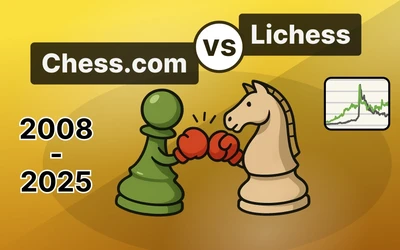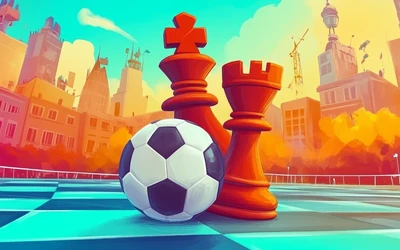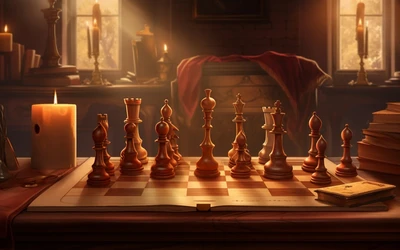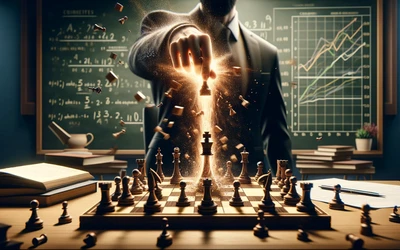
Midjourney AI generated
How I got into the top 50 in the Lichess Summer Bullet Marathon 2025
"I feel the need... the need for speed," - Tom Cruise in the movie Top GunHi all
I seem to be a hopeless fan of bullet chess. It is not "real chess" to some, but for me, it is a great source of joy and relaxation. One big part of bullet chess has always been speed.
I wanted to see recently if I could do the Lichess marathon, and I managed to get into the top 50. Here are some interesting tips and observations about bullet chess, and also some of my weaknesses I feel I could work on - where on occasion I actually came spectacularly unstuck.
On the second half day of the bullet marathon, around 1pm I was on my desktop machine at home, and I was doing some chess work stuff in the morning. Suddenly, my monitor went black, and soon the other two as well. I did a forceful reboot and it was extremely slow with no windows taskbar. How badly was my machine messed up I wondered. Did I need a new graphics card? Did I need to replace the RAM chips or the CPU, etc. So anyway, after some while I got a task bar and the interrupts were over 90%. I looked this up on an iPad and it mentioned it may be graphics card related. I did a restart and again the screen went black soon after and everything at a crawl. Anyway, I rebooted another two times, and somehow the issue cleared up.
The relief was immense - I felt it was great to have my computer again! Anyway in the back of my mind, there has been one saying from the funny "IT Crowd series" - which is this:
"Have you tried turning it off and on again?"
https://www.youtube.com/watch?v=5UT8RkSmN4k
For technology related things, this seems to indeed fix a lot of issues. Computers are a form of state machine - going into an initial safe state is often a good idea, instead of trying to recover. The guy that did the highly popular "WhatsApp" so robustly was a keen advocate of monitoring processes in a language called Erlang by Joe Armstrong. He has some amazing takes on IT generally and philosophy that I love:
https://www.youtube.com/watch?v=rmueBVrLKcY
Anyway, in IT, it does seem as though generally we can expect disasters to happen, and trying to recover from them, it is often best to be able to restart a process. You may be in a 'suffering state' where things are also going slowly. Sometimes it takes an extra observer to note that and restart that process.
So, having got my machine back to "normal" at around 2pm - I also tried to reduce risks by getting rid of the now useless Skype Window - which has been replaced by Teams and a now controversial CC-Cleaner. So I got rid of those from startup just in case they didn't help - and restarted my machine again. All seemed fine, and I felt a huge sense of relief.
So I felt after this I should take the rest of the day off, in fact, and joined the Lichess marathon for bullet around 2.30pm on an iPad at my friend's place. At the start of the marathon, it seemed generally I was winning most games, and not risking any berserking. Things started to get tougher, and the thought occurred to me, when I started losing games on time more frequently, what if I just restarted the iPad? I noticed a few evenings back that somehow either Lichess had gotten slow for me, or something else - maybe my iPad was simply faster after a restart.
I restarted the iPad after about 2 hours in!
Things did seem a bit smoother and faster, after an iPad restart. Note that months ago, I had also tried to switch off every single background process I didn't need. I thought I had already optimised this iPad for Lichess bullet. But something was going into a slightly slower state. The restart did seem to help. And so I did this every hour or two when I felt I could have done with an extra 2 seconds at the end or more. This approach seemed to be working.
So even the iPad seemed to have something "leaking" - not Lichess - but this iPad, where I thought I had turned everything off. The IT Crowd’s classic advice seemed to be coming in useful here.
Other recommendations and general observations
Caro-Kann and London System players, I tend to do badly against!
I felt I lost a lot of games vs the Caro-Kann. It seems also if I have to play against the London System, I can also have this hopeless feeling. But it is not just a hopeless feeling - it is a feeling that I have to start pushing pawns aggressively. This was especially highlighted in this game against the fantastic site Admin LaDiva, where all of a sudden, I felt the need to punish "solid play" with a reaction of creating a ton of weaknesses in the hope of an attack. The result was quite spectacularly funny:
I took a mental note of this, and for some reason, even though I have extensively analysed things like the Fantasy Variation against the Caro-Kann, it never kind of appears to me as a candidate move to play f3 here:
I never even played this move once during the entire tournament. I think it is because moving the f-pawn actually brings up too much background pain and anxiety. As Ben Finegold has said:
"Never move the f-pawn" - Ben Finegold.
So it seems if something feels a bit risky and unprincipled, it doesn't matter actually how many hours you want to research it, there may be this background human anxiety about it, which leads to not actually using it. The opposite I guess can be said of the London System and Caro-Kann. Note that I also did not use the Caro-Kann or London System during this event either.
Did Botvinnik use the Sicilian defence much against Mikhail Tal? No - he wanted to be safe and principled and often used the Caro-Kann vs Tal with generally good results. So we have a formula here for wasting time on openings or not:
Does the opening you want to spend hours researching "feel" safe, sound, and secure - or are there aspects to it that cause you anxiety?
If the answer is - yes, there are some aspects of it which don't feel right - then maybe ones that feel better might be better for you. I feel perhaps the opposite when I play 1.Nc3 - looking forward to d5 and d4 from the opponent's understanding that often I can later win on the light square weaknesses created.
Black's game is already in trouble here as far as my win statistics are concerned! So this opening fills me with the opposite of the f3 Fantasy Variation - to the extent, I get more practice, and less anxiety about it generally, which leads to more practice, and the cycle goes on. The background anxieties and concerns of an opening might be a big influence on not playing an opening you have researched, and the opposite would be logically true if you just have that "good gut feeling" about the strength of an opening in practice, regardless of what engines think.
Engines don't have human anxiety about any moves!
A chess engine just tries to play the best move - the move could be winning a pawn and having to defend precisely for the next 30 moves to avoid being mated quickly. They will still play that move rather than a safer-looking one that still might be winning, but maybe winning a bit more slowly.
Emerging loss patterns - mainly the dreaded Caro-Kann!
So generally I felt I was doing the worst vs. the Caro-Kann response to my 1.Nc3 - so I really need to find a system vs Caro-Kann that I could truly believe in and also be somewhat engine-approved. If I don't believe in it or have any range of anxiety, it seems I will not practice it. In fact what I do against the Caro-Kann has a certain "feel good" which seems logical and has scored me at least a decent win rate, which is this:
B15 Caro-Kann Defense: von Hennig Gambit
This does often work but when against 2500+ opponents, they generally just have a super-easy time - and also seem to be exceptionally fast with it too. They stick their bishop on g6 with the extra pawn and basically I feel mocked for doing an unsound gambit.
Conclusion here: I need something else with the Caro-Kann, and I am not sure I can practice the Fantasy Variation!
Side note: London System dread as well.
If I had played Kurald's London System as a side note here, I am pretty sure I would have lost every single game as black.
Downsides of the opponent's position
For me, this is a classic and perhaps obvious piece of advice - I think chess is largely about trying to exploit the downsides of the opponent's position. This is in the general sense. Also, in a very specific sense one of my favourite middlegame tips is "The Weakness of the last move" which was motivated by a Maurice Ashley video called "The Secret of Chess":
https://www.youtube.com/watch?v=M_okqyKTD-4
I found this video pretty inspirational and thought it could be remembered as "Weakness of the last move". When the opponent plays a move, there is a positive and a negative to it. They could have just given you a new golden opportunity on a plate. "Downsides of opponent's position" is looking more broadly into the opponent's position as a whole - what negatives are there to it. Maybe it generally has a weaker king than usual, or weak squares somewhere.
Nutrition and Water Aspects
It wasn't just the downsides creeping into my iPad, which I tried to compensate with a restart every two hours - my brain as a machine needed constant hydration. I recommend Pellegrino - not just water but also some added minerals. Some supermarkets offer a discount on getting a batch of 6. Worth checking out.
I stayed off the Almonds in this marathon - went mainly with the water. I had a dinner break around 7pm - which was a burger, some beetroots and salad.
Conclusions and Philosophical Points
I am just an anxious creature, driven it seems by fear or the memories of fear, driven also by victories and the pleasant sensations associated with victories. These need to be embraced as well as the downsides of our machines we use to play bullet chess, and our own brain that needs to be kept hydrated!
If we truly embrace ourselves as creatures of comfort, it might help us stick with what we’ve researched and become better at those systems! I.e., Choose things to research that don't have any concerns associated with them, even if they seem to be theoretically okay, like the Fantasy Variation vs the Caro-Kann.
Enjoyed this post? Your likes and follows appreciated.
You may also like
 ChessMonitor_Stats
ChessMonitor_StatsWhere do Grandmasters play Chess? - Lichess vs. Chess.com
This is the first large-scale analysis of Grandmaster activity across Chess.com and Lichess from 200… FM MathiCasa
FM MathiCasaChess Football: A Fun and Creative Variant
Where chess pieces become "players" and the traditional chessboard turns into a soccer field CM Kingscrusher-YouTube
CM Kingscrusher-YouTubeThe Complete Guide to Chess Opening Principles -"King Safety Driven Development"
An unexpected perspective on the classic golden chess opening principles CM Kingscrusher-YouTube
CM Kingscrusher-YouTubeThe importance of Chess Visualisation skills
Reminders abound for the importance of chess visualisation skills CM Kingscrusher-YouTube
CM Kingscrusher-YouTube